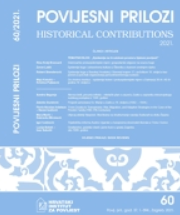Epidemije kuge u Banskoj Hrvatskoj i Slavoniji krajem 17. i početkom 18. stoljeća kao povod za početak organiziranja javnozdravstvenoga sustava
Plague Epidemics in Banal Croatia and Slavonia at the End of the 17th and the Beginning of the 18th Century: The Beginnings of Organizing the Public Health System
Author(s): Robert SkenderovićSubject(s): Local History / Microhistory, Government/Political systems, Health and medicine and law, 17th Century, 18th Century
Published by: Hrvatski institut za povijest
Keywords: plague; epidemics; public health; Croatia; Slavonia; 17th and 18th centuries;
Summary/Abstract: The plague epidemics that ravaged the Habsburg Monarchy from 1677 to 1716 strongly influenced the development of health institutions and the organization of a public health system. Primarily, there was a need to employ a larger number of educated medical doctors and to establish institutions that would deal with health and epidemiological issues, especially during the epidemics. In 1710, Emperor Joseph I established the Court Sanitary Commission (Sanitäts-Hofkommission), which would soon become the central public health institution in the Habsburg Monarchy. Research of historical documents has shown that two other institutions were especially important for the Croatian-Slavonian lands during the epidemic of 1708-1716: the Court War Council in Vienna, and from 1710 the Hauptdeputation in Contagionssachen in Graz. It is evident from the mentioned documents that the Deputation, as the main (Haupt-) Inner Austrian anti-epidemic institution, also coordinated the anti-epidemic activities in Banal Croatia and the Varaždin Generalate. The plague epidemic in the Habsburg Monarchy from 1708 to 1716 is very important in this sense, because the experience and structure of the anti-epidemic system built at that time were the basis for the establishment of a later permanent system of Sanitary Commissions and Sanitary Cordon, which began in the 1730s and was fully formed with the enactment of the General Health Act (Generale Normativum in Re Sanitatis) in 1770. These experiences proved to be especially useful for Banal Croatia, which was not affected by the plague epidemic of 1708-1716 due to the anti-epidemic measures.
Journal: Povijesni prilozi
- Issue Year: 2021
- Issue No: 60
- Page Range: 77-96
- Page Count: 20
- Language: Croatian

